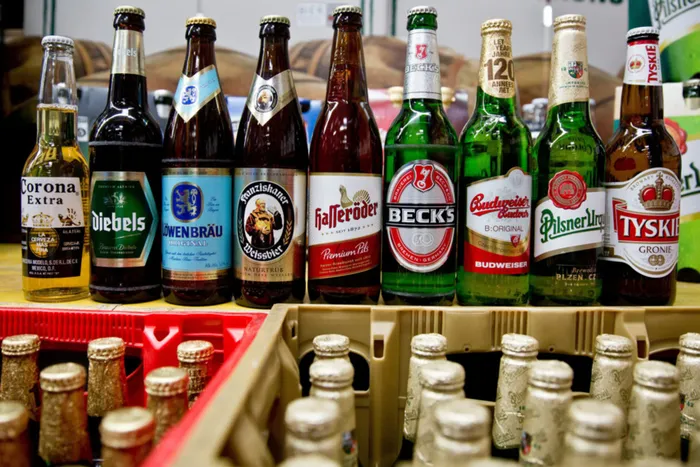3 billion reasons for AB InBev to seal deal

(From left to right) Corona, Diebels, Loewenbraeu, Franziskaner, Hasseroeder, Beck's and Budweiser beers, owned by Anheuser-Busch InBev, are seen next to Pilsner Urquell and Tyskie drinks, owned by SABMiller, in Nuremberg, Germany. Picture: Daniel Karmann (From left to right) Corona, Diebels, Loewenbraeu, Franziskaner, Hasseroeder, Beck's and Budweiser beers, owned by Anheuser-Busch InBev, are seen next to Pilsner Urquell and Tyskie drinks, owned by SABMiller, in Nuremberg, Germany. Picture: Daniel Karmann
London - SABMiller has agreed in principle to a record-breaking £68bn takeover by AB InBev after the Belgian beer giant hiked its proposed offer for the Peroni brewer for a fifth time.
The board of SAB said yesterday it is prepared to “unanimously” recommend a £44 a share cash offer from the maker of Budweiser and Stella Artois. The two sides also agreed on a massive $3bn (£2bn) “break fee”, which will be payable by AB InBev if the deal fails to close.
Shares in SAB surged 9 percent, or 326.5p, to 3,948p, after the companies announced the agreement.
The 4,400p proposal is up from Monday's 4,350p approach, and 16 per cent above InBev's initial 3,800p a share offer which SAB spurned last month.
It represents the biggest takeover of a British company. A deal would combine AB InBev's dominance in Latin America with SABMiller's Africa presence, where it is the market leader in 15 countries. Combined, the companies would be responsible for one in three beers sold around the world.
Jonny Forsyth, a global drinks analyst at Mintel said a takeover would help lessen the impact on the big brewers from a rising craft beer sector in the US and Europe.
Forsyth added: “This means that growth for mainstream beer players is now about a strong presence in emerging markets where there is still a huge and growing demand for more mainstream, affordably priced beer brands.”
The agreement comes after a month of spurned approaches that saw a split develop between SAB's two biggest shareholders, the US tobacco giant Altria and the Santo Domingo family of Colombia. They have stakes of 27 percent and 14 percent respectively.
AB InBev is also offering a cash and partial share alternative for 41 percent of the stock as part of the deal which could help Altria and the Santo Domingos avoid large tax bills.
The deadline for AB InBev to table a firm bid to SAB investors, which originally was 5pm today, has now been extended until 28 October so the pair can thrash out the terms of the deal.
Altria said yesterday it was “pleased that ABI and SABMiller have taken these steps”. However, SAB's fourth largest shareholder, South Africa's Public Investment Corporation, said its preference “is that all shareholders be treated equally and be given InBev common shares”.
It added that it is critical for the new entity to be listed on the Johannesburg Stock Exchange. “The PIC will be engaging with both AB InBev and SABMiller regarding the finer details of the listing as well as ensuring that the rights of minority shareholders are taken into consideration during and post this transaction.”
The South African government also said it would examine the deal closely and “in the extreme” could try to block the deal. SAB employs 6 400 people in the country, and contributed £790m in taxes to the country's economy last year.
The takeover by the world's largest brewer of the second largest player in the market is also expected to face especially close scrutiny by competition regulators in China and the US.
THE INDEPENDENT